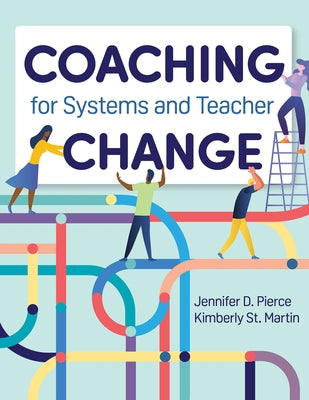- Description
Description
Coaching between educators is one of the best ways to improve outcomes for all learners--but coaches rarely get formal preparation for mastering this important role. Give coaches the expert support they need with this essential new resource, a comprehensive guide to what effective coaching looks like across the PreK-12 grade span and how to conduct powerful coaching cycles with teachers and teams.
With a focus on improved practice for coaches and big-picture systems change, the authors combine relevant research with hands-on guidance and resources for planning, conducting, and reflecting on the quality of coaching when working with individual teachers or leadership teams. Readers will start with foundational information on coaching goals, activities, and challenges; a synthesis of research on coaching practices that work with teachers and teams; and guidance on applying systems-level change principles to the coaching process. Then theyâ (TM)ll get strategies and resources to help them implement the key features of an effective coaching framework (see below). Vivid examples show what successful coaching looks like at different grade levels, and 30 downloadable tools help coaches take confident action, reflect on their practices, and continuously improve.
A must-have professional reference for coaches, educator teams, and administrators, this book is the key to conducting powerful coaching sessions that lead to better outcomes for every student.
Implement an effective coaching framework through:
- Alliance building: Take an intentional approach to developing an equitable, mutually beneficial partnership with a shared purpose.
- Observing: Watch the teacher or team in action, gather simple data, and use the data to construct feedback and encourage reflection.
- Modeling: Demonstrate to coachees how to use a specific teaching or teaming practice.
- Providing performance feedback: Share your feedback so that coachees have concrete, actionable data that helps them reflect on their practices and advance their goals.
- Coaching Protocols
- Reflecting on My Coaching Role
- Coaching Compact
- Readiness Assessment
- Understanding System Challenges
- Conducting Plan-Do-Study-Act Cycles
- Alliance Assessment
- Tips for Networking Teachers and Teams
- Coaching Implementation Checklist
- Calculating the Fiscal Costs of Coaching
- Coaching Self-Assessment
- and more!
Author: Jennifer D. Pierce, Kimberly St Martin
Publisher: Brookes Publishing Company
Published: 08/08/2022
Pages: 192
Binding Type: Paperback
Weight: 1.00lbs
Size: 11.40h x 8.80w x 0.60d
ISBN13: 9781681254227
ISBN10: 1681254220
BISAC Categories:
- Education | Teaching | General
- Education | Professional Development
- Education | Counseling | Career Development
About the Author
Jennifer D. Pierce, Ph.D., is Senior Technical Assistant Consultant/Researcher for American Institutes for Research (AIR) with experience working as a teacher, coach, and building- and district- level leader. She also has served in higher education as an adjunct instructor. Her areas of expertise center on supporting the implementation of evidence-based interventions by teachers and schools, including teacher and systems coaching models to reduce the research-to-practice gap; implementation science and systemic change, including frameworks across fields and factors associated with sustained use of evidence-based interventions; and the application of Multi- Tiered Systems of Support (MTSS) across general and special education. Dr. Pierce also has a background in literacy instruction for struggling learners.
Dr. Pierce works in two capacities at AIR: to provide high-quality technical assistance to educators and to conduct meaningful research with practical application to the school setting. On the research side, Dr. Pierce serves as the implementation and coaching lead for several randomized control trials. She is also the project director for an Institute of Education Sciences (IES)â "funded study examining the psychometric properties of a MTSS fidelity tool. On the technical assistance side, Dr. Pierce leads coaching and systems change projects for national technical assistance centers, including the National Center for Systemic Improvement (NCSI).
Dr. Pierce is committed to translating research into usable materials for teachers, coaches, and leaders. As a prior colead for the Global Implementation Society Standards Committee and founding member of that worldwide group, she stays attuned to the most recent findings of implementation science to improve the uptake of research in educational settings. Toward this end, she has authored peer-reviewed articles, numerous free, online tools (including coaching modules), and this book.
Dr. Pierce is originally from Seattle and earned her doctoral degree in special education from the University of Washington. She lives in New York City with her wife.



